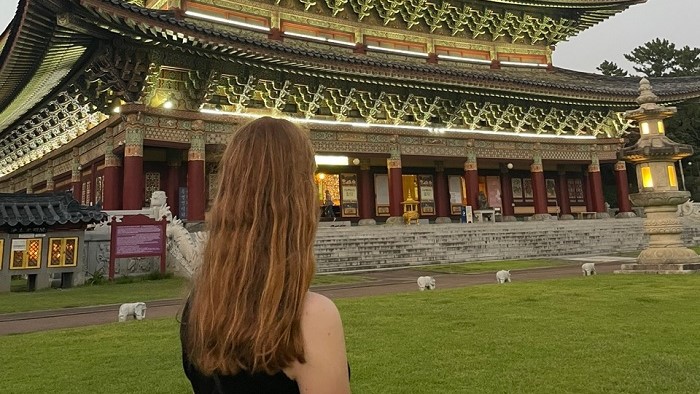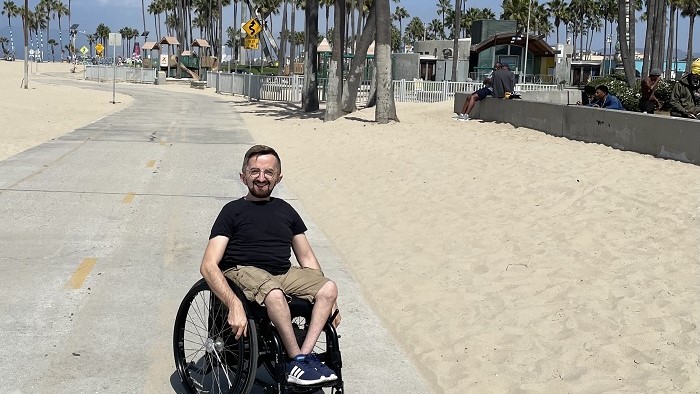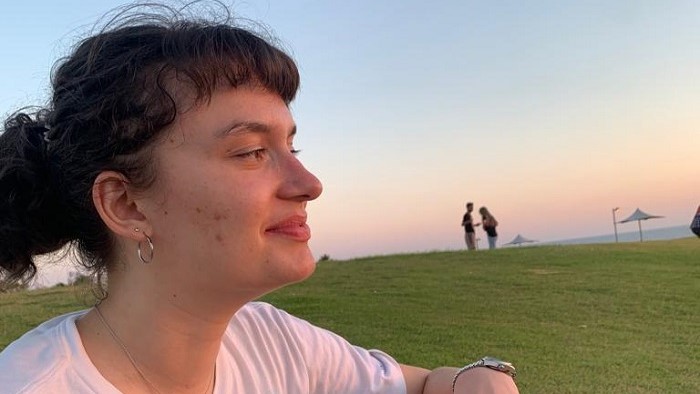Dream destination South Korea
Julia Zitzelsberger is studying business administration at the Deggendorf Institute of Technology (DIT). However, the MWP scholarship holder spent the winter semester 2020/21 in South Korea. To this day, she is fascinated by the culture and has met wonderful people. Where she wanted to go for her studies abroad was clear to the bachelor's student very early on in her planning:
"My dream destination for my semester abroad was Asia, specifically South Korea. Personal interest played a role, because I wanted to get as far away from Germany as possible to immerse myself in a completely different culture. With the diversity of Korean culture, no tuition fees and a very good reputation for English-language studies in Asia, South Korea is predestined for this. Thanks to the funding by the Max Weber Program, I was also able to take a Korean language course before starting my studies abroad.
 MWP scholarship holder Julia Zitzelsberger from Deggendorf spent the winter semester 2020/21 in South Korea. To this day, she is fascinated by the country's culture. On a short trip, she had the opportunity to visit the Yakcheonsa Temple on Jeju Island.
MWP scholarship holder Julia Zitzelsberger from Deggendorf spent the winter semester 2020/21 in South Korea. To this day, she is fascinated by the country's culture. On a short trip, she had the opportunity to visit the Yakcheonsa Temple on Jeju Island.
My favourite university was Kookmin University in Seoul, which is one of the most popular partner universities of the DIT. As a child from the countryside, I always wanted to experience city life for a certain period of time, and where better than in the mega-metropolis of Seoul? Nevertheless, the university itself borders the Bukhansan Nature Park and thus offers a nice contrast to the pulsating city life.
The campus is quite large and there are many different facilities such as cafés, shops, a gym and even a traditional tea house. There are many faculties such as Business Administration, but also Architecture, Law, Design and many more. An exchange semester there can therefore be suitable for many degree programmes. In addition, the university offers a variety of student clubs. For example, there are various sports clubs for judo or football, as well as music and engineering clubs. The most peculiar club is probably the Kookmin Cat Club, which takes care of the stray campus cats.
The semester abroad in South Korea was utterly rewarding for me. You learn a lot about yourself during your stay, meet great people and create incredible memories in an absolutely fascinating culture. I can highly recommend South Korea for a semester abroad and I am very grateful for the unforgettable time I was able to spend there."
Studying in the San Francisco Bay Area
Simon Höferlin is completing his Master's in Management & Technology at the TU Munich this year. Today, the MWP scholarship holder looks back on his experiences abroad with gratitude. At first, it was unclear whether he would be able to take up his semester abroad at the University of California, Berkeley, due to the Corona pandemic. But in August 2021, the time had come and he moved into his room in the International House. As a wheelchair user, he received funding for a barrierfree dormitory room in addition to the MWP study abroad grant. A few weeks later, he shared his impressions of his time abroad with the Max Weber Program:
"I've been in the US since 17 August and have settled in very well at UC Berkeley. My dorm room in the International House is top-notch. Every day I meet new people in the Dining Hall, discuss the German federal elections with Spaniards and Frenchmen, learn about the latest genetic technologies from a doctoral student or discuss acute social challenges with Americans. The campus is incredibly beautiful and active, although really steep, which is sometimes a real challenge with a wheelchair.
 Studying where others go on holiday felt both surreal and mundane for MWP scholarship holder Simon Höferlin.
Studying where others go on holiday felt both surreal and mundane for MWP scholarship holder Simon Höferlin.
I take my courses in the beautiful South Hall of the School of Information and deal with the topics Lean & Agile Product Management, Product Design, Front-end Web Technologies and Python Programming for Data Analytics. The way of teaching here is very different from what I am used to. There are quizzes, assignments every week and group projects in almost every subject. The workload is therefore constantly quite high, but there is no concentrated exam period at the end of the semester. The professors are very approachable and the lectures are interactive. Sometimes you get the impression that every professor here is an entertainer, which seems to have been ingrained in the Americans. I'm now in my fifth week of lectures here and over a third of my semester abroad is unfortunately already over.
Sometimes I look out the window at the Bay Area and wonder how I ended up here. It feels a little surreal and at the same time frighteningly mundane. I'm grateful for all the people and coincidences that have made this possible for me and proud to have seized the opportunities."
Studying law in the "holy city”
Elisabeth Adam is studying law at the University of Passau. In the summer of 2021, she moved from there to Israel for an academic year. She chose the Hebrew University of Jerusalem (HUJI), a partner university of the University of Passau. Looking back, the MWP scholarship holder would choose to study in Jerusalem again at any time:
"The courses I was able to attend at HUJI were very rewarding for me academically and personally. The Law degree programme there is less rigorous than in Germany and the teaching modalities are varied. In addition, I took an intensive Hebrew course throughout the year and learned to speak and write the language well for everyday use, which opened the doors to some friendships. Overall, I would say that Hebrew University is recommended for the International Law degree and has a very diverse and top-notch English-language course programme.
 Law student Elisabeth Adam definitely wants to return to Israel after her studies at the Hebrew University of Jerusalem.
Law student Elisabeth Adam definitely wants to return to Israel after her studies at the Hebrew University of Jerusalem.
In addition to my studies, I completed an internship in an Israeli-Palestinian women's rights organisation based in Tel Aviv and was mainly involved in a project to fund UNSCR 1325 "Women, Peace and Security" in the region. I also accepted an offer to work as a research assistant to a professor of constitutional and comparative law at Reichmann University in Herzliya.
I would describe my social life outside of university as very fulfilled. Jerusalem has a lot to offer and thanks to my predominantly Israeli circle of friends, I quickly knew the popular places and knew about events. But the "Office of Student Life", a HUJI university group, also provided international students with event tips. One tradition I grew to love were the almost weekly Shabbat dinners with one of my best friends. Regularly on Friday evenings, when the whole country, but especially Jerusalem, had slowed down for the holy day of rest and the shops and restaurants were closed, we would get together with other friends for dinner. Everyone contributed to the menu and we often sat up late talking and playing games.
I would choose to study in Jerusalem again at any time and also plan to return there for a longer stay abroad."
Text: Svenja Üing, Max Weber Program Bavaria




